As a content writer, balancing writing for humans and satisfying Google can be tricky. Add SEOs and editors to the mix and well — you got a whole lot of i’s to dot and t’s to cross.
To make content creation (and life) easier for writers, we reached out to 10 SEO experts asking them to share their take on one burning question:
What do SEOs wish more content writers would know?
From using metadata to realizing that the SERP isn’t everything, our experts had a lot to share.
Ready to find out more? Let’s dive in.
Table of contents
- Pay attention to search intent
- Writers need to understand information gain
- While writing, forget about SEO
- Use metadata, always
- Crap with the right keywords is still crap
- Cut the intro, you probably don’t need it
- Answer the reader’s question immediately
- Writers need to do more than regurgitate SERP results
- Never underestimate the power of internal linking
- The SERP isn’t everything
1. Pay attention to search intent
As the Director of the search marketing agency, Straight Up Search, Jamie Irwin has worked with several e-commerce businesses and offers writers a treasure trove of SEO wisdom.
But his #1 piece of advice?
Pay attention to search intent.
“It’s easy to get wrapped up in creating an amazing story or crafting beautiful words, but if you don’t keep the search intent in mind, then all that hard work won’t pay off. The goal of any piece should be to provide helpful information and answer questions that people are searching for online. That means understanding why someone would be looking for a certain topic and providing them with exactly what they need,” explains Jamie.
In addition to keeping a strong focus on search intent, Jamie wants content writers to “consider how you structure your writing so it’s easily scannable by readers who prefer skimming over reading every word.”
“Break long passages into shorter sentences and paragraphs; use headings and subheadings; bold key phrases throughout the text; add images wherever possible; include bulleted lists when appropriate. These simple tactics can help make your content much easier for readers (and potential customers) to digest quickly as well as more likely show up higher in search engine results pages (SERPs),” he explains.
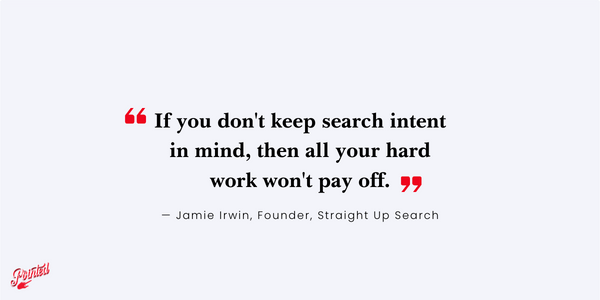
2. Writers need to understand information gain
Now more than ever, it’s crucial for content writers to understand Google’s information gain patent, according to freelance SEO consultant, Mervin Lance Calabia.
“I wish that content writers understand information gain. I’ve worked with many writers but only a few actually go the extra mile to write something new that’s different from those already seen in ranking articles,” says Mervin.
“Google’s information gain patent attempts to provide a more diverse set of answers instead of search results that say the same thing. Although the information across content may be similar when they address a common topic, Google would reward content with a higher score when they add more information about the topic. Simply put, content that provides a more thoughtful answer is ranked higher,” he explains.
His top tip for writers is to research, research and research some more. But not just any kind of research, the thoughtful kind that goes beyond what’s on the SERP’s first page.
“Research is not limited to Google. Writers can also extend their research from books and documents that aren’t indexed by search engines. They can also source information from experts, especially for B2B brands with specialized niches. This way, the content is not only going to attract organic search traffic but also organic links from other websites.”
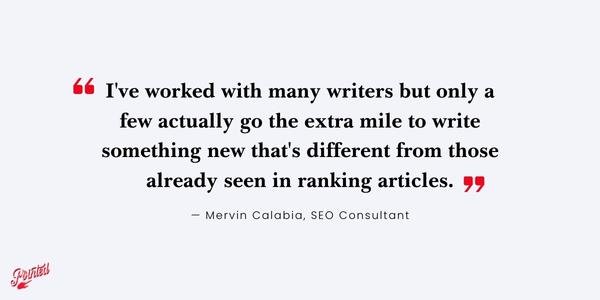
3. While writing, forget about SEO
According to Yoni Slavin who runs SEO at Israel-based web development agency wemake, the first thing they tell content writers is to “not put a whole lot of stress on old school SEO practices.”
“It might sound counterintuitive yet following Google’s Helpful Content Update, the quality ranking factors such as time on page and bounce rate are a lot more valuable to me and those can be achieved only with a writing style that is using NLP (Natural Language Processing) and storytelling,” says Yoni.
Yoni believes that the popularization of AI writing also means that “lower quality writing can now be achieved with ease.” For Yoni, the true value of the content writer “is to make a piece of content actually fun and interesting to read and leave the SEO out of the picture during the writing process.”
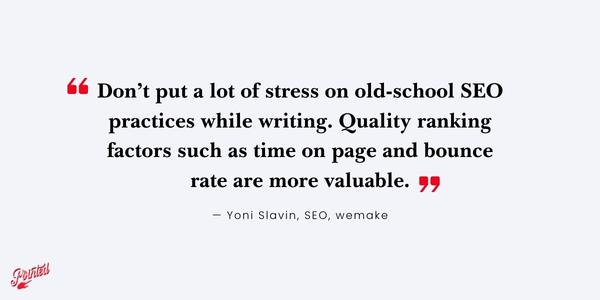
4. Use metadata, always
When creating content, Kate Wojewoda of dynamic Infrastructure as Code platform Spacelift advises writers to learn to use metadata to enrich the content they create to make it easy for search engines to find it.
“SEO is all about getting your content seen by as many people as possible. And one of the best ways to do that is by using metadata,” says Kate. “Metadata is information you add to your content that helps search engines understand your article. It includes titles and descriptions that should incorporate your targeted keywords. So it’s important to be mindful of these when creating your content,” she explains.
Her top tip for content writers is to focus on quality over everything else because, in the long run, that’s what really counts.
“My tip would be that, at the end of the day, it’s the quality of your content that will make or break your success in SEO. Search engines want to deliver the best possible results to their users, so if your website has high-quality, engaging content, you’re more likely to rank higher in search results,” she says.
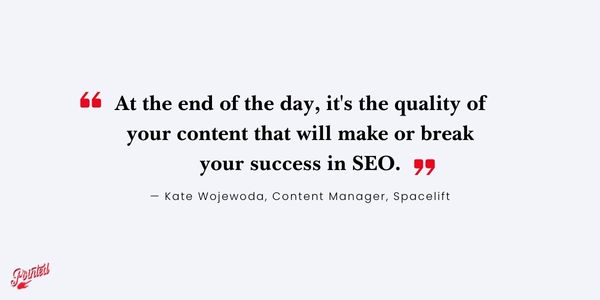
5. Crap with the right keywords is still crap
Adam Smartschan is a B2B strategist and agency leader. His one wish is for content writers to nurture a deeper understanding of how Google works.
“Google doesn’t ‘reward’ tricks — your keyword density, bold-text strategy and intralinking aren’t ends to themselves. They’re the kind of elements that are typically present in what Google REALLY wants: authoritative, trustworthy content delivered by an expert,” says Adam.
According to Adam, this implies that the best way to win with SEO is to forget about the keyword and formatting hack and focus on serving the reader first. (Noticing a common theme here? 😉)
Like Yoni, he advises writers to “think about keywords last. Rather, start with a topic and a thesis. “What would my target user search for to find me, and what would make them happy THAT they found me?”
The way he sees it, “That’s what you need to deliver — nothing more, nothing less.”
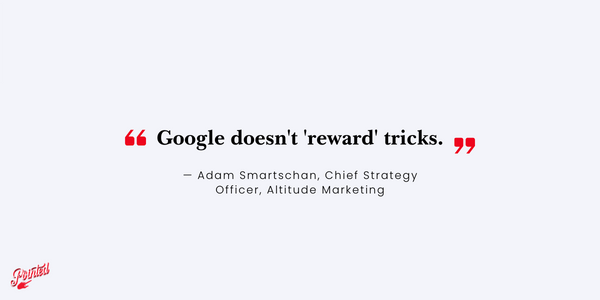
6. Cut the intro, you probably don’t need it
According to Marco Palma of PRLab Hub, content writers need to perfect the art of getting to the point immediately.
“While an introduction is nearly always needed, it is better to get to the point immediately. If this sounds like you, chop off the first paragraph (or two) after you’ve written your piece and see if what you wrote still makes sense. The chances are it’s now better,” says Marco.
Marco also advises writers to rely on tools like Semrush to structure their pieces to increase the chances of their content snagging Google’s answer box or featured snippet.
“When writing informative content, use Semrush to understand the questions customers use on Google to search for that content. Structure the content based on customer questions, using each question as a section heading, and answer each question in as few words as possible. This makes it more likely to appear as an answer box or featured snippet of Google, giving the webpage more exposure.”
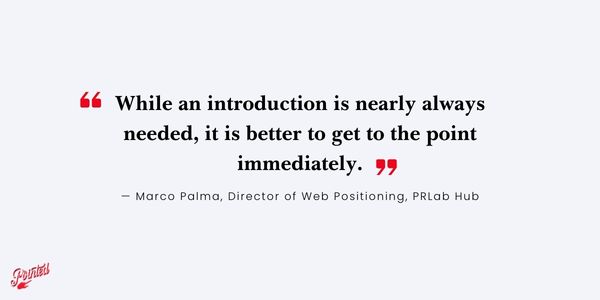
7. Answer the reader’s question immediately
While this may sound like advice you’ve heard a gazillion times, Harry Boxhall believes answering the reader’s question right off the bat is one aspect of SEO writing that can’t be overemphasized.
“When readers quickly find the information they’re looking for and stay on the page to read it, this sends a positive signal to search engines like Google that your page is relevant and useful, which can improve its ranking in search results,” says Harry.
Not only do you send a positive signal to Google when you answer the reader’s question right away, you also “build trust and credibility with your readers, which can encourage them to read more of your article and potentially share it with others.”
Harry also recommends that you conduct thorough research to ensure the content you create is accurate and up-to-date. You should also make sure your content offers readers new information, unique insights, or simply entertainment.
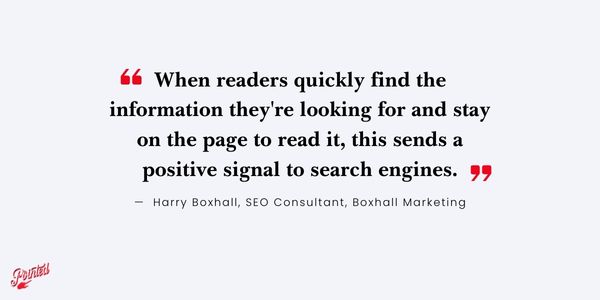
8. Writers need to do more than regurgitate SERP results
As an experienced B2B Marketing Manager, Josh Brown knows what it takes to create content that stands out. And like Mervin, he believes it’s all about going above and beyond to provide real value to the reader.
The one thing he wants content writers to know:
The best pieces are more than just a regurgitation of the top results in search.
Josh champions using top results to create outlines but he wishes content writers would know that’s not enough to take their pieces from meh to amazing.
“Don’t get me wrong — it’s a great place to start as it can help with identifying search intent and what topics should be included, but the best pieces go beyond what the top results discuss. Researching (books, social media) and interviews allow writers to turn what would otherwise be a ‘meh’ piece into something that’s potentially great,” says Josh.
Josh also emphasizes the role of search intent in creating relevant and useful content that also happens to rank well. He believes this is particularly crucial when dealing with broad keywords vs. long-tail keywords.
“To understand intent, identify the primary keyword you want to optimize and research the intent behind it by looking at the top posts that are ranking on Google. Additionally, take a look at ‘People Also Ask’ to further get an idea of what you want to incorporate in the post as part of your research into search intent.”

9. Never underestimate the power of internal linking
Dawid Zimny has been managing content and SEO at NerdCow for 4+ years and there are two major areas where he wishes content writers would raise their game.
“The first is the power of internal linking, a tactic overshadowed by backlinks and SEOs chasing ‘virality’. It’s very important to consider creating topical ‘clusters’ when writing for the web. It not only helps users find interesting content but also creates authority in the eyes of search engines,” says Dawid.
“They [Users] discover your content by using links. If you can create those clusters and link them together, you’ll see a massive improvement across the entire group of articles. The top hint for this one is to make sure the links are contextual, in the actual body. A section for ‘Related articles’ is a cool feature to have, but natural links in the content are much more valuable,” he explains.
For the second part, Dawid admits that most of this doesn’t fall on the writer’s shoulders, but it can go a long way in improving SEO and that is to optimize the images you include in your content. “It makes a tremendous difference for the loading times, which are important for users and search engines alike.”
“First, make sure you’re using the right format — there’s no need to have a PNG image when it’s just a picture without transparency. Second, use online compressors. You can aim for the 70% setting in quality and you won’t even notice the difference, but the file size can go down by over 80%.”
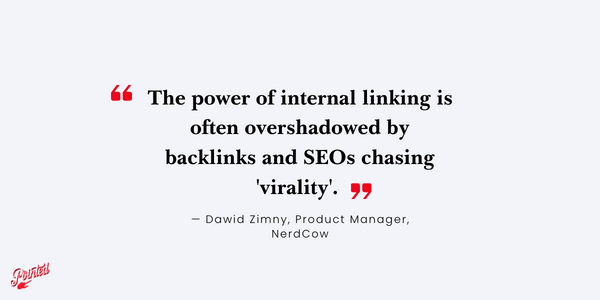
10. The SERP isn’t everything
“The SERP isn’t everything,” says Alex Lindley of Law Firm Content Pros.
According to Alex, “an article being on page one” simply doesn’t justify adding unhelpful or irrelevant information to your content.
“Also, if you only write about subtopics that are in articles on page one, you won’t add anything new. Why should Google even bother indexing that — much less ranking it highly? It amounts to a regurgitation of what’s already in the index, which doesn’t serve Google’s purpose of providing the best content to users,” he says.
Alex advises writers to look beyond what’s already been said.
Instead, you should focus on “what hasn’t been said, or what hasn’t been said clearly or completely, and find a way to address that part on top of the essential information about the subject you’re covering.”
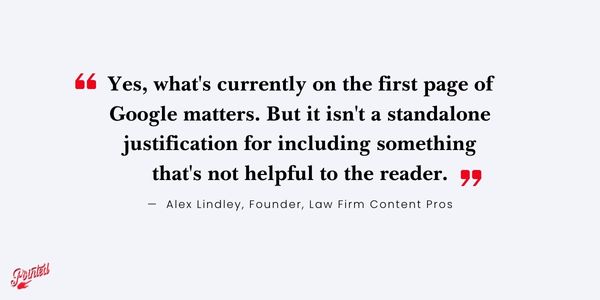
Creating great content goes beyond following SEO best practices
While the importance of following SEO best practices can’t be overemphasized, creating unique, high-quality content requires a lot more than getting the Yoast SEO green light.
Ultimately, content that converts is content that speaks directly to the reader’s real pain points, is well-researched, and includes a genuinely unique point of view.
Creating this type of content takes time and effort. But if you use it to solve real problems, the result is almost always worth it.
Mujidat is a freelance copywriter and editorial assistant for Pointed. She works with funded B2B SaaS and tech brands to map out a strategy and create content that aligns with their marketing goals and drives ROI.
